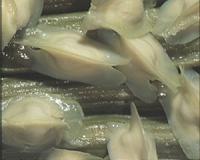| . |  |
. |
United Nations (AFP) March 22, 2010 More people die from unsafe water than from all forms of violence, including war, UN Secretary-General Ban Ki-moon said Monday in a message to mark World Water Day. The United Nations children's agency UNICEF noted that more than 155 million people, or 39 percent of the population in West and Central Africa, do not have access to potable water, with only eight of 24 countries in the region on track to meet key poverty-reduction targets by 2015. "These deaths are an affront to our common humanity, and undermine the efforts of many countries to achieve their development potential," Ban said as the issue was discussed at a high-level UN General Assembly dialogue. "Day after day, we pour millions of tons of untreated sewage and industrial and agricultural wastes into the world's water systems," he said, noting that clean water has become scarce and would be even scarcer as a result of climate change. US Secretary of State Hillary Clinton raised the stakes, saying that global peace and security will depend on access to water. "Access to reliable supplies of clean water is a matter of human security. It's also a matter of national security," she said. Government stability and economic growth will always depend on countries' ability to successfully manage water in a world where water resources grow scarcer by the day, the chief US diplomat added, urging rich countries to realize the importance of their role in the matter. Ban stressed that the world has the know-how to solve the challenge and urged nations to "become better stewards of our water resources." UNICEF said the water situation in West and Central Africa "remains a major concern," with the region home to the lowest coverage of potable water worldwide. It said the total number of people in the region without access to improved potable water increased from 126 million to 155 million people from 1990 to 2008. Despite an improvement in coverage from 49 percent in 1990 to 61 percent in 2008 -- countries needed to reach 75 percent by 2015. Six countries have less than 50 percent drinking water coverage: Chad, Democratic Republic of the Congo, Equatorial Guinea, Niger, Mauritania and Sierra Leone. Also of concern is the fact that 291 million people have absolutely no access to sanitation in West and Central Africa, the region with the highest under-five mortality rate of all developing regions at 169 child deaths per 1,000 live births. The Nile River Basin, home to 180 million spread across 10 East African countries, is also largely mired in poverty and conflict, Clinton noted. "Cooperative management of the basin's water resources could increase economic growth -- increase it enough to pull many of these countries out of poverty and provide a foundation for greater regional stability," she said. The theme of this year's World Water Day, "Clean Water for a Healthy World," highlights the fact that both the quality and the quantity of water resources are at risk. Nine countries in Africa's drought-affected Sahel region will meet in Chad on Thursday to find ways to manage scarce water supplies and protect people against food shortages, a Chad official told AFP on condition of anonymity. The Permanent Interstate Committee for Drought Control in the Sahel -- which groups Burkina Faso, Cape Verde, Chad, Gambia, Guinea Bissau, Mali, Mauritania, Niger and Senegal -- will focus on setting up a global coalition on managing water. Many of the member countries have suffered drops in food production due to erratic rains. "Without water, there will be no prospects for achieving all MDGs (Millennium Development Goals)," UN Under-Secretary-General for Economic and Social Affairs Sha Zukang said. At a 2000 UN summit, world leaders set a 2015 deadline for achieving Millennium Development Goals. These include eradicating extreme poverty and hunger, achieving universal primary education, empowering women, reducing child mortality, and combating HIV/AIDS, malaria and other diseases. burs-cs/oh/mlm
Share This Article With Planet Earth
Related Links Water News - Science, Technology and Politics
 Worlds Most Usefull Tree Provides Low-Cost Water Purification
Worlds Most Usefull Tree Provides Low-Cost Water PurificationWashington DC (SPX) Mar 08, 2010 A low-cost water purification technique published in Current Protocols in Microbiology could help drastically reduce the incidence of waterborne disease in the developing world. The procedure, which uses seeds from the Moringa oleifera tree, can produce a 90.00% to 99.99% bacterial reduction in previously untreated water, and has been made free to download as part of access programs under ... read more |
|
| The content herein, unless otherwise known to be public domain, are Copyright 1995-2010 - SpaceDaily. AFP and UPI Wire Stories are copyright Agence France-Presse and United Press International. ESA Portal Reports are copyright European Space Agency. All NASA sourced material is public domain. Additional copyrights may apply in whole or part to other bona fide parties. Advertising does not imply endorsement,agreement or approval of any opinions, statements or information provided by SpaceDaily on any Web page published or hosted by SpaceDaily. Privacy Statement |